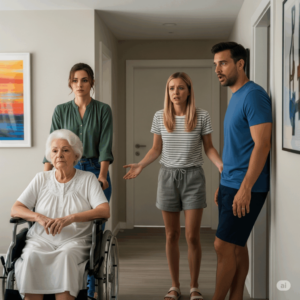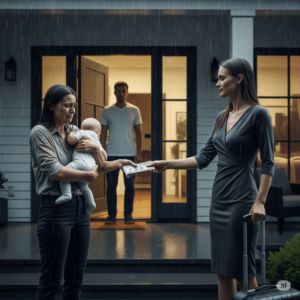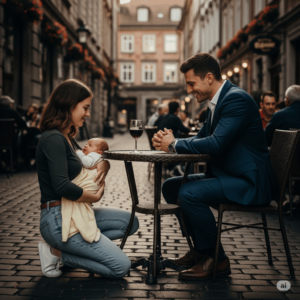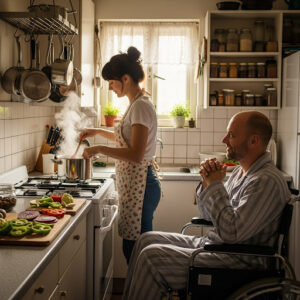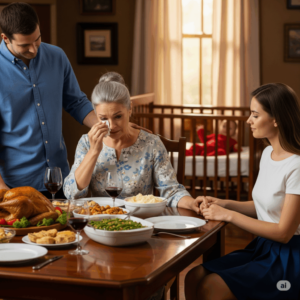I didn’t tell my son about my heritage! A week after the wedding, his wife arrived… with papers…
They say that weddings bring families closer together. But sometimes, in silence, they show you how far away you have become.
She was wearing the pink dress she had been keeping for years. I baked the banana bread he used to like. I even ironed the sweater with the little pearl buttons he had told me made me look like mom from old TV shows. But when I walked into the wedding hall and realized that no one had ever saved a place near it, I knew.
When my son got married, I didn’t tell him that I inherited $7 million from my husband. Thank goodness…
Something in me changed. And that change would end up changing everything. Northern Michigan is quiet in spring.
Not calm as peace, but calm as if you had been forgotten. My house is next to a quiet lake, surrounded by pine trees and memories. I live alone now.
My husband Mark passed away four winters ago. Our son Owen visits us less and less, but I understand. Young people have their lives.
That’s what we raised them for, isn’t it? Lately, my days have been slow. I bake banana bread in the morning, read the local newspaper with a cup of warm coffee, then water the row of stubborn tulips outside that refuse to bloom in time. Sometimes I see the mail truck pass by without stopping.
And sometimes I wonder if he stops for someone else on the road he also checks every afternoon and pretends he doesn’t expect anything. Owen called me three weeks ago to tell me he was getting married. He sounded excited, distracted.
He said her name was Lauren. I asked her what kind of wedding they were planning. He said they were thinking of something simple but elegant.
Then he took a detour. He didn’t ask about my thoughts. He didn’t ask which weekends suited me.
I asked him if they needed help with anything. He said not to worry me. That they already had everything figured out.
I told him I’d love to make the cake for the rehearsal dinner. He laughed politely. He said that was sweet.
I hung up and stared at the phone for a while. I felt something then. Something I didn’t say out loud.
Like he’d given me the guest role in a story I thought I helped write. But I chose to stay hopeful. I chose the dress.
I cleaned the porch. I even sewed the hem of my coat. Because part of me still believed that maybe, just maybe, this wedding could bring us a little closer again.
Sometimes, the biggest losses don’t come with screams or doors closing. They arrive in silence. In polite little rejections that feel like a thousand cuts.
The kind of silence that follows you to bed at night and makes you wonder when you stopped being necessary. The wedding took place at a lakeside resort, two hours south. An elegant place, with wooden beams and floor-to-ceiling windows looking out over the water.
Owen said it was Lauren’s idea. I wanted something modern yet timeless. I arrived early out of habit.
She wore the pink dress that she had kept ironed for years, with soft pleats at the waist, nothing too flashy. My hair up. Soft lipstick.
The kind of outfit a mother would wear on her child’s most important day. I walked alone through the lobby. The girl at the entrance handed me a name tag and smiled as if she had no idea who I was.
The label only said Sylvia Hartley. No mention of the groom’s mother. Without the small bond that the bride’s family had.
I held it in my hand for a moment, then put it on. Inside the main hall, people were grouped in groups. Laughter hung over the soft music.
The waiters moved around with trays of champagne and small spoons of something cold and expensive. I saw Owen near the front with Lauren surrounded by people I didn’t recognize. He didn’t see me right away.
One of the planners, a young man in tight pants and headphones, beckoned me to a table in the back. I looked around. The nearby tables had posters.
Co-workers of the groom. Extended bride family. The bridesmaid’s parents.
My card just said Sylvia. No last name. Untitled.
I sat between a man who sold home insurance and a woman who raised alpacas in Vermont. They were both friendly. None of them had met Owen.
They talked about me most of the night. During the toast, the microphone was passed to Lauren’s father, her brother, and then her college classmate. There was a joke about tequila shots and a summer camp souvenir.
At one point, someone asked when the groom’s mother would speak. Lauren laughed and said maybe later, then moved on. When dinner came, it was served and quiet.
I ate the chicken. It was dry. A buttered bread roll remained intact next to it.
I noticed that no one at my table finished their meal. The desserts were fancier than they looked. One bite of the lemon cake and I felt more bitter than sweet.
Owen never made it to my table. Not once. She danced with Lauren, then with her mother, then with someone’s aunt.
I waited, fixed the hem of my dress three times, smiled at a photographer who passed me twice without picking up the camera. At the end of the night, I sat in that rented chair, surrounded by empty plates and people already halfway to their cars. I would slowly fold my napkin and tuck it under the rim of my cup.
No one said goodbye. No one noticed when I left. It was a week after the wedding before Owen called me.
He said he wanted to invite me to dinner, just the two of us. He said Lauren would be out with her friends. His voice sounded cheerful but measured.
I could tell that it was trying to sound casual. I told him I would go, no questions asked. That night, I put on the same sweater I had when I first took Owen home from the hospital.
It was still soft on my wrists. I baked a tray of oatmeal cookies and wrapped them in foil. The trip was silent.
The roads were dry, the sky cloudy in a gray way that makes you feel like winter isn’t over, even when the calendar says otherwise. Owen’s new home was in a tidy neighborhood on the edge of town. Brick exterior, trimmed hedges, the kind of place with matching porch lights and a camera on the door.
She opened the door with a smile, quick and polite. He gave me a short hug that barely touched my shoulders. He said the kitchen was at the back.
Dinner wasn’t ready. Instead, there was a table set for two, a bottle of wine already uncorked, and a small stack of papers neatly placed next to the salad plates. The papers were held in place with paper clips and a blue pen was placed diagonally over the first page.
Owen poured me a drink, asked about the trip, praised me for the cookies. His tone sounded rehearsed, as if he were speaking through a script he had memorized but not written. Then he pointed to the papers.
He said it was just something for peace of mind. In case something happened to me. He said it would make things easier.
Just a durable power of attorney, a common form. Everyone is doing it. He said these things as if they were weather reports.
Distant, practical, without emotion. I nodded, took the package. The words on the first page were full of legal terms, but the language underneath was clear.
Financial authority, real estate management, full access, immediate effect, no expiration. He didn’t say son. It didn’t say family.
He said agent. It said authorization. It said control.
He smiled and said there was no hurry, but the pen was already uncovered. I noticed then that the plates on the table were empty. There was no food, no smells from the kitchen.
He just came. Only papers. Just a silent request under a friendly tone.
I left the package and told him I would take it home. I said I would review it carefully. He nodded once and reached for his wine, looking quickly at the pen and then at my face.
He did not argue. It was not necessary. His silence said enough.
We talk about nothing after that. The weather. The new neighbor’s fence.
A cable program that I did not know. When I got up to leave, he walked me to the door, gave me another hug, even lighter than before. Back in the car, I didn’t start the engine right away.
I sat there, hands in my lap, the foil-wrapped cookies still intact on the passenger seat. The porch light behind me went out after a minute. Motion sensor.
Efficient. Automatic. Just like dinner.
I returned home that night and didn’t bother to take off my shoes. I sat on the edge of the couch, my coat still half-buttoned. Hands resting on my lap as if they didn’t belong to me.
The house was quiet. Too quiet. Even the kitchen clock seemed to have stopped ringing.
For a moment, I wasn’t sure if I was breathing. After a while, I got up and walked towards the basement. My knees ached as I came down, and the air was cold, the kind that settles into old wooden beams.
In the background, behind the washing machine, was a cabinet hidden under a shelf of paint cans. I had to kneel to reach him. Inside was a small metal box.
He hadn’t opened it since the year Mark died. He always said that if something happened to me, I would find what I needed there. I never had a reason to look at it before.
But that night, something inside me knew it was time. The lid opened with a crack. Everything inside was organized just as Mark always kept it.
He was meticulous in that way. Stacked, clamped, and labeled folders. In the background was a letter with my name written in his handwriting.
My chest tightened just at the sight of her. The letter was brief. Really a paragraph.
He said he knew he wouldn’t ask for help, even if he needed it. That she had organized everything to ensure that she would never be trapped or dependent on anyone. He said not to tell Owen.
Not because she didn’t love him, but because she knew how the world worked. Money changes people, and sometimes reveals what they already were. The files listed two accounts in my name, an investment portfolio I never knew existed, stock options, mutual funds, and an annuity tied to a small property in Texas.
In total, it was more than seven million dollars. I looked at the number, then closed the folder, then opened it again, thinking maybe I had misread. I didn’t cry.
Not then. I didn’t feel relief either. It was something heavier, like holding a secret too big for the room.
I sat there on the basement floor for a long time, the cold seeping into my legs, the metal box still open next to me. What I felt most was the weight of what Mark had left behind. Not just money.
Trust. Forecasting. The silent protection I never knew I needed until that night.
He had seen something coming before I did, and somehow, in his own quiet way, he had left me what I needed most. No security. Not wealth.
Election. I closed the box. I locked it.
I got up slowly, my legs stiff, my hands shaking in a way that had nothing to do with age. Upstairs, I turned off all the lights in the house except the one in the kitchen, sat down at the table with a blank notepad and the stack of papers Owen had given me, and began to write. Not what he wanted, but what I had to say.
The next call came two days later. Mid-morning. I had barely sat down with a bowl of cereal still wearing my house slippers.
The phone vibrated once, then again. I let it go to voicemail the first time. The second time, I answered.
Owen’s voice was softer than usual, almost careful. He said he wanted to know how I was feeling, asked if I had had a chance to review the papers. I said yes.
I kept my tone steady. He paused for a second too long, then said that there was no hurry, but that it would be good to put things in order. Just in case.
I asked him what he meant. He started saying something about planning, being practical, protecting myself. But the words came in circles.
He mentioned a story he heard about a woman who lost access to her accounts after a stroke. Then he mentioned his friend’s mother, who forgot her passwords for months. I could hear what was underneath.
A list of reasons not based on concern, but on strategy. When I fell silent, his throat cleared. He said he only wanted the best.
Then his voice changed slightly, the blade returned. He said that if he waited too long, it would be harder to get everything in order. He said he should think about the future.
He said that the smart thing to do would be to sign now as long as everything was simple. I looked out the window as he spoke. The trees were bare.
A squirrel crossed the garden, stopped, then dove into a patch of bushes. I watched her disappear and felt a sharpness digging behind my ribs. I told him I’d think about it.
He said he was fine. She then added that Lauren had found a financial advisor who could help make everything easier. They would be happy to arrange it for me.
We end the call. I stood there for a long time, the soggy cereal in front of me. I couldn’t move.
I thought about all the nights I spent with Owen when he was sick. How I once drove five hours in a snowstorm to bring him a spare tire. Not because I had to.
Because I wanted to. Because that’s what love meant to me. And now he was talking to me as if I were a transaction.
A logistical step. The house felt smaller than usual. The densest silence.
I got up, emptied the cereal into the sink, and ran the water until the last bit of milk was gone. Then I opened the drawer next to the refrigerator, took out the manila envelope where I had stored everything Mark left me and held it for a while. It didn’t feel like protection.
Not yet. It felt like the last piece of something he had built for me. And now, it was time for me to build something for myself.
Not out of anger. But because even love has limits. And I had finally reached mine.
It took me three days to decide what to do. Not because I wasn’t sure. But because I needed silence to mean something.
I didn’t want my next step to come from fear or pride. I wanted him to come from knowing. To understand what was being asked of me and what I could no longer allow.
I found Carol’s number written on the back of an old birthday card. She used to work as a trust and real estate attorney before retiring. We hadn’t spoken in years, not since her husband passed away.
But I remembered how he once said that the quietest women tend to leave the most permanent marks. When I called her, she answered immediately. His voice sounded older, but high-pitched.
I told him what was happening. She did not react. He just listened.
Then he said we should meet. No bragging, no judgment, just coffee and clarity. We sat at his kitchen table the next afternoon.
Her house was small, tidy, full of quilts and books. I handed him the envelope. She read every line of Mark’s papers, her eyes moving like a woman who had read too many things too late for too many people.
When he finished, he looked at me and said that I had more power than I had realized. That the money was protected, the investment was strong, the legal standing solid. But only if I kept it that way.
He asked me if I wanted to set up a trust. I said yes. He asked me who I wanted to name.
I said no one. Not yet. Maybe never.
Assented. Then he told me to bring everything Owen had given me. I took the stack of papers out of my bag.
She flipped through them undeterred. He said the language was aggressive. An immediate authority sweeping access, without supervision.
He said these were not documents written to care for someone. These were written to absorb someone. We rewrote everything.
We transfer the accounts to a private trust under my full control. We closed access after conditions that no one could avoid. Carol added a medical clause that required two independent doctors to confirm any loss of capacity before any authority changed.
Then he handed me a pen. I signed slowly, carefully. Not because I was nervous, but because it felt like drawing a line that I should have drawn years ago.
A simple line on the paper that said I am not invisible. I’m not a convenience. I’m not yours to drive.
When we were done, Carol slipped everything into a thick folder. He told me to keep it in a place where I could easily access, but not obviously. I put it in the back of the cabinet under the sink, hidden behind a box of dishwasher pills that no one touches.
Driving home, the air felt different. Brighter, somehow. Not lighter, but sharper
Teenager.
As if I could finally see the shape of my life without squinting. And for the first time in a long time, I didn’t feel like someone’s forgotten mother. I felt like a woman with a backbone.
And an option.
As the days passed after the documents were signed, Sylvia felt a strange mixture of relief and anxiety. She had made the decision to reclaim her life, to no longer be a spectator in the story of her son and her husband. But something inside her was still uneasy, as if that choice came with a price she hadn’t yet fully understood.
That afternoon, after putting everything in its place, Sylvia sat down on the sofa with a book she had left on the coffee table. The house was quiet, something that was no longer as comforting to him as before. From time to time, the creak of the floor could be heard as he walked through the house, the familiar sound of a house that had been his refuge for so many years.
Suddenly, the doorbell rang. A sound so unexpected that it brought her out of her reverie. He looked at his watch; It was too late for anyone to come. He walked slowly towards the door, not knowing what to expect, but with the feeling that something had changed, something was about to arrive.
When he opened the door, there was Owen, standing, with an expression he couldn’t decipher. It wasn’t his usual bright smile, nor the confident posture he’d shown in the past. His face was tense, and his eyes avoided hers.
“Owen?” Sylvia asked, surprised to see him.
“Hello, Mom. His voice sounded hollow, as if he was searching for the right words but couldn’t find them. He didn’t give her a hug like he usually did, not even a smile. Just a quick greeting, which denoted a kind of invisible distance between them.
Sylvia frowned, sensing that something was not right. She invited him in, but he stood in the doorway, staring down the hallway as if he didn’t know what to do with his feet.
“What’s going on?” She asked, her voice soft but full of concern.
“I have to talk to you. Owen seemed hesitant, as if he didn’t know how to start the conversation.
Sylvia stared at him, trying to comprehend the change in him. I knew something was happening, that it wasn’t just the distance of the last few months. Something deeper, something he hadn’t wanted to reveal. What was happening?
“Owen, sit down.” Sylvia pointed to the couch and sat down in front of it. “You know you can always talk to me. No matter what happened, we are family.
He looked at his mother and, for a moment, his eyes softened. As if that look was enough to open the door that had been closed between them for so long.
“Mom, I have to apologize. Owen lowered his head, his voice hesitant. “I know I wasn’t the son you expected. I know I haven’t been there for you like I should. But, more than anything, I want to apologize for… What happened after the wedding.
Sylvia looked at him cautiously. I knew what he meant, but I wasn’t prepared to listen to what was next.
“What you did… with the papers. Owen whispered, his eyes full of regret. “It was a bad decision. You know that I respect you and… I didn’t want all this to affect you. I just wanted to make sure everything was in order. I thought it was for the best.
Sylvia watched him in silence, her heart pounding in her chest. She knew what he had tried to do, but Owen’s words felt empty, as if the weight of his actions was not entirely clear to him.
“Owen, I don’t need your papers or your control tests. Sylvia replied, firmly, trying to remain calm. “What matters to me is that you left me out, that you ignored me in what I needed most. I felt invisible. It wasn’t because of the money, son. It was because of you. Because of our relationship.
Owen opened his mouth as if he wanted to say something else, but he couldn’t. A lump formed in his throat. His mother was speaking with a calmness that puzzled him, but at the same time, he felt the truth of every word.
“I don’t know what happened between us, Mom. Owen finally admitted, letting out a frustrated sigh. —What started as something simple became something… bigger than I thought. And I realized late that I didn’t include you, that I didn’t give you what you really need from me. Sorry for all that.
Sylvia stared at him for a long time. Pain, disappointment and discomfort were present in his gaze, but there was also something else. Hope. Because, even if the words didn’t change what had happened, there was something about the way Owen said it that made her think that maybe there was still a chance to heal.
“I don’t need your apology, Owen. Sylvia whispered softly. “I need you to understand what’s important. I need you to see me as I am, not as a tool to get what you want.
Owen swallowed. He felt the weight of his actions. He knew he couldn’t turn back time, but there was something inside him that he needed to understand, something that Sylvia had pointed out without him seeing it before.
“I promise I won’t leave you aside anymore, Mom.” Owen said sincerely. “And I’ll do everything in my power to get back to being the son you need.”
Sylvia smiled softly, a small but meaningful smile. I wasn’t sure what would happen next, but at the time, I felt like something had changed. Owen was beginning to understand.
“That’s all I need, son. No perfection, no control. Just be together, again. Sylvia said, her voice trembling a little with excitement.
After a long silence, Owen stood up and hugged her tightly, as if it was the only way to correct what he had broken between them.
“Thank you, Mom.” She said, and for the first time in a long time, Sylvia felt her son really see her.
The definitive change
Over the next few months, the relationship between Sylvia and Owen began to heal. Selling the house they had shared with Mark was a long and painful process, but liberating at the same time. Owen grew closer to his mother, although there were still some shadows of the past, they began to rebuild what they had lost.
Sylvia, for her part, found comfort in the little things. She began to dedicate herself more to herself, her hobbies and to spend time with the women of the neighborhood, who became her new support network.
Soon after, Owen began to notice that his mother no longer needed him as much as he thought. Sylvia was rebuilding her life, again, by herself. And when it came time to make peace with the inheritance money, she decided not to take it. He knew that what he needed most was already there: the opportunity to choose his own path.
One day, Owen asked him if he wanted to accompany him to a new house he had found, a small, simple, but perfect place for both of them. Sylvia accepted with a calm smile.
The real inheritance was not in the money, but in the freedom to be who you really are, Sylvia thought as she got into the car, looking out the window with the satisfaction of having finally found peace.
END.

